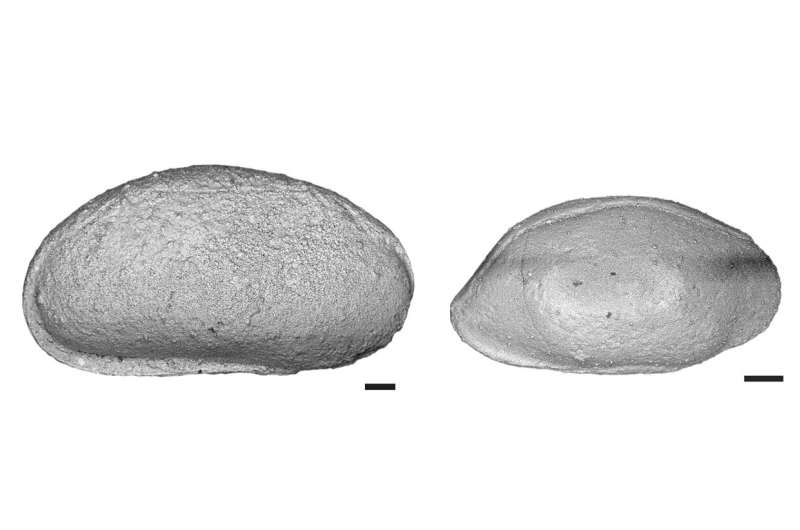Gradual global warming culminated at the end of the Permian Period in a gigantic extinction event, study finds

At the end of the Permian Period, approximately 250 million years ago, more than 80 percent of all maritime species became extinct after volcanic eruptions in Siberia released huge quantities of greenhouse gases and caused the atmosphere to heat up.
Using what is known as a paleothermometer, a team of researchers from the Museum für Naturkunde in Berlin (MfN), the GFZ German Research Center for Geosciences in Potsdam, and FAU were able to calculate that temperatures rose by approximately 10 degrees Celsius, beginning in a period long before the peak of the mass extinction, contrary to what had commonly been believed to date.
Using ostracods as a paleothermometer
The international team led by Jana Gliwa and Dieter Korn from the (MfN), Michael Wiedenbeck (GFZ) and Wolfgang Kießling (FAU) have taken a closer look at climate change in the late Permian Period. They measured oxygen isotopes in the calcified shells of tiny ostracods found in northwestern Iran in collaboration with scientists from Ferdowsi University Mashhad and were able to calculate how warm the oceans were at that time based on their measurements.
Using this new paleothermometer—the name given to methods scientists use to estimate the ambient temperature at the time a natural material was formed—the researchers were able to prove that temperatures rose gradually. The oceans began to heat up approximately 300,000 years before the mass extinction, and peaked at the same time as the extinction event.
“The tiny calcified shells of the ostracods were surprisingly well preserved considering their age. This allowed us to use them as a thermometer to measure the temperature of the seawater at that time,” explains lead author Jana Gliwa. The calcified shells were measured using an ion probe at GFZ German Research Center for Geosciences in Potsdam. This method can be used to analyze samples weighing less than one billionth of a gram.
Increased temperatures as a warning sign of mass extinction are also visible today
Although the increase in temperature is still considerably lower than 250 million years ago, the factors that led to a mass extinction at the end of the Permian Period are very reminiscent of the situation today, says Prof. Wolfgang Kießling from FAU.
“There is much evidence of severe global warming, ocean acidification and a lack of oxygen. What separates us from the events of the past is the extent of these phenomena. We should take these warning signs of an impending mass extinction very seriously.”
The research was published in Palaeontology.
Geologists report earlier evidence of impending mass extinction in the Permian, and present-day parallels
Jana Gliwa et al, Gradual warming prior to the end‐Permian mass extinction, Palaeontology (2022). DOI: 10.1111/pala.12621
Citation:
Gradual global warming culminated at the end of the Permian Period in a gigantic extinction event, study finds (2022, September 6)
retrieved 6 September 2022
from https://phys.org/news/2022-09-gradual-global-culminated-permian-period.html
This document is subject to copyright. Apart from any fair dealing for the purpose of private study or research, no
part may be reproduced without the written permission. The content is provided for information purposes only.
For all the latest Science News Click Here
For the latest news and updates, follow us on Google News.

